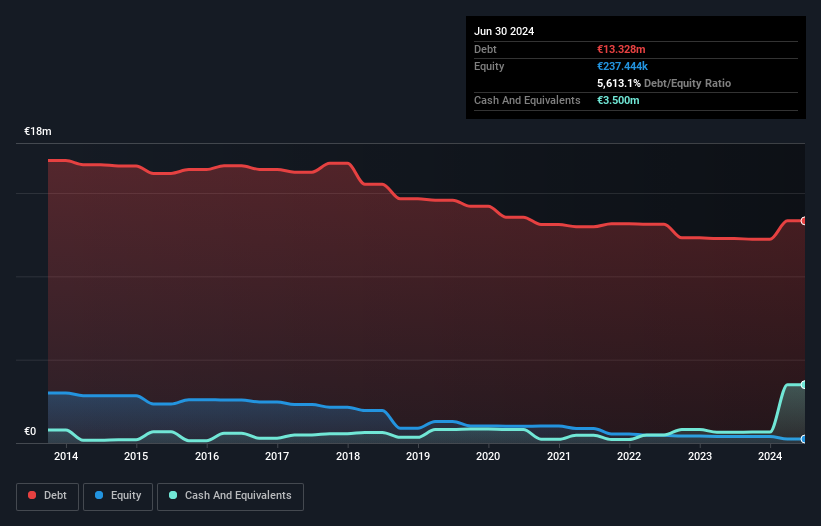Doppler (ATH:DOPPLER) Has Debt But No Earnings; Should You Worry?
Legendary fund manager Li Lu (who Charlie Munger backed) once said, 'The biggest investment risk is not the volatility of prices, but whether you will suffer a permanent loss of capital.' So it seems the smart money knows that debt - which is usually involved in bankruptcies - is a very important factor, when you assess how risky a company is. Importantly, Doppler S.A. (ATH:DOPPLER) does carry debt. But the more important question is: how much risk is that debt creating?
Why Does Debt Bring Risk?
Debt assists a business until the business has trouble paying it off, either with new capital or with free cash flow. In the worst case scenario, a company can go bankrupt if it cannot pay its creditors. However, a more frequent (but still costly) occurrence is where a company must issue shares at bargain-basement prices, permanently diluting shareholders, just to shore up its balance sheet. Of course, the upside of debt is that it often represents cheap capital, especially when it replaces dilution in a company with the ability to reinvest at high rates of return. When we think about a company's use of debt, we first look at cash and debt together.
Check out our latest analysis for Doppler
What Is Doppler's Net Debt?
As you can see below, at the end of June 2024, Doppler had €13.3m of debt, up from €12.3m a year ago. Click the image for more detail. On the flip side, it has €3.50m in cash leading to net debt of about €9.83m.

A Look At Doppler's Liabilities
According to the last reported balance sheet, Doppler had liabilities of €16.3m due within 12 months, and liabilities of €8.89m due beyond 12 months. Offsetting this, it had €3.50m in cash and €9.63m in receivables that were due within 12 months. So its liabilities total €12.0m more than the combination of its cash and short-term receivables.
This deficit casts a shadow over the €7.80m company, like a colossus towering over mere mortals. So we definitely think shareholders need to watch this one closely. At the end of the day, Doppler would probably need a major re-capitalization if its creditors were to demand repayment. When analysing debt levels, the balance sheet is the obvious place to start. But it is Doppler's earnings that will influence how the balance sheet holds up in the future. So if you're keen to discover more about its earnings, it might be worth checking out this graph of its long term earnings trend.
In the last year Doppler had a loss before interest and tax, and actually shrunk its revenue by 6.8%, to €17m. We would much prefer see growth.
Caveat Emptor
Importantly, Doppler had an earnings before interest and tax (EBIT) loss over the last year. Indeed, it lost €36k at the EBIT level. Considering that alongside the liabilities mentioned above make us nervous about the company. We'd want to see some strong near-term improvements before getting too interested in the stock. For example, we would not want to see a repeat of last year's loss of €1.2m. And until that time we think this is a risky stock. There's no doubt that we learn most about debt from the balance sheet. But ultimately, every company can contain risks that exist outside of the balance sheet. For example Doppler has 4 warning signs (and 3 which are a bit unpleasant) we think you should know about.
Of course, if you're the type of investor who prefers buying stocks without the burden of debt, then don't hesitate to discover our exclusive list of net cash growth stocks, today.
New: Manage All Your Stock Portfolios in One Place
We've created the ultimate portfolio companion for stock investors, and it's free.
• Connect an unlimited number of Portfolios and see your total in one currency
• Be alerted to new Warning Signs or Risks via email or mobile
• Track the Fair Value of your stocks
Have feedback on this article? Concerned about the content? Get in touch with us directly. Alternatively, email editorial-team (at) simplywallst.com.
This article by Simply Wall St is general in nature. We provide commentary based on historical data and analyst forecasts only using an unbiased methodology and our articles are not intended to be financial advice. It does not constitute a recommendation to buy or sell any stock, and does not take account of your objectives, or your financial situation. We aim to bring you long-term focused analysis driven by fundamental data. Note that our analysis may not factor in the latest price-sensitive company announcements or qualitative material. Simply Wall St has no position in any stocks mentioned.
About ATSE:DOPPLER
Doppler
Engages in design, production, installation and maintenance of elevators, elevator components, and mechanical components and structures worldwide.
Slight risk with mediocre balance sheet.
Market Insights
Community Narratives



